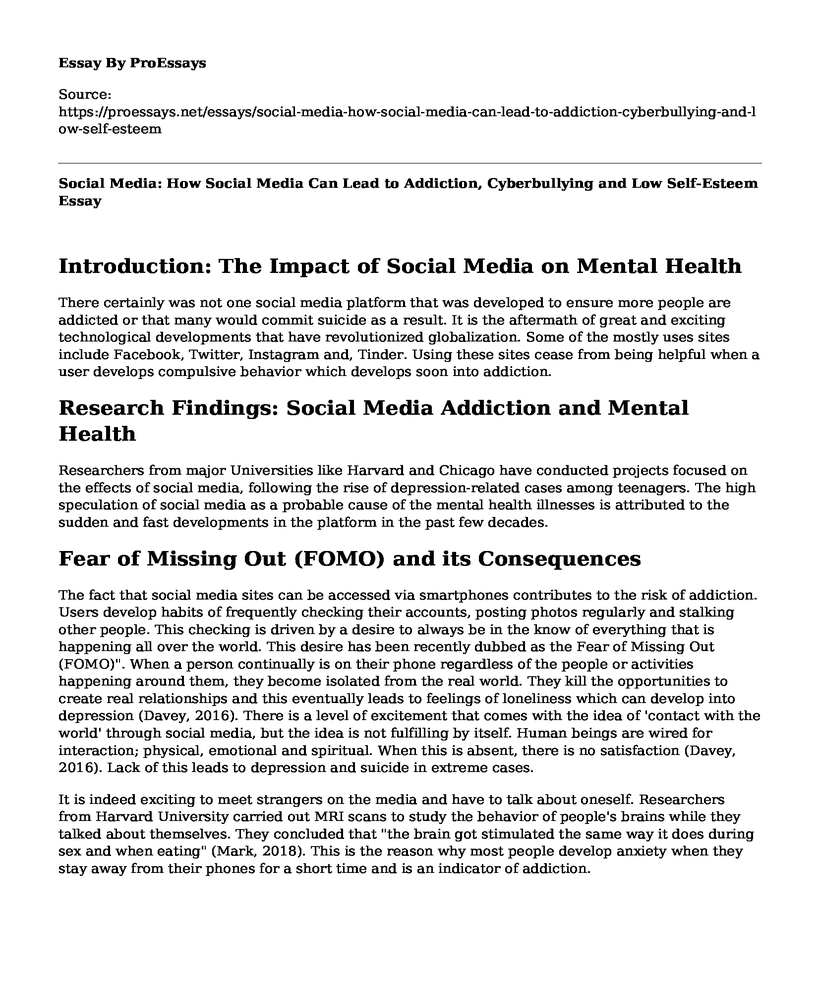Introduction: The Impact of Social Media on Mental Health
There certainly was not one social media platform that was developed to ensure more people are addicted or that many would commit suicide as a result. It is the aftermath of great and exciting technological developments that have revolutionized globalization. Some of the mostly uses sites include Facebook, Twitter, Instagram and, Tinder. Using these sites cease from being helpful when a user develops compulsive behavior which develops soon into addiction.
Research Findings: Social Media Addiction and Mental Health
Researchers from major Universities like Harvard and Chicago have conducted projects focused on the effects of social media, following the rise of depression-related cases among teenagers. The high speculation of social media as a probable cause of the mental health illnesses is attributed to the sudden and fast developments in the platform in the past few decades.
Fear of Missing Out (FOMO) and its Consequences
The fact that social media sites can be accessed via smartphones contributes to the risk of addiction. Users develop habits of frequently checking their accounts, posting photos regularly and stalking other people. This checking is driven by a desire to always be in the know of everything that is happening all over the world. This desire has been recently dubbed as the Fear of Missing Out (FOMO)". When a person continually is on their phone regardless of the people or activities happening around them, they become isolated from the real world. They kill the opportunities to create real relationships and this eventually leads to feelings of loneliness which can develop into depression (Davey, 2016). There is a level of excitement that comes with the idea of 'contact with the world' through social media, but the idea is not fulfilling by itself. Human beings are wired for interaction; physical, emotional and spiritual. When this is absent, there is no satisfaction (Davey, 2016). Lack of this leads to depression and suicide in extreme cases.
It is indeed exciting to meet strangers on the media and have to talk about oneself. Researchers from Harvard University carried out MRI scans to study the behavior of people's brains while they talked about themselves. They concluded that "the brain got stimulated the same way it does during sex and when eating" (Mark, 2018). This is the reason why most people develop anxiety when they stay away from their phones for a short time and is an indicator of addiction.
Comparison and Self-Esteem Issues on Social Media
Exposure to the beautiful side of other people's lives, which is what is displayed on social media could make a person feel jealous or discontent with what they have. It is common to take photos of the best moments, filter them through the many photo applications, photoshop before posting them on social media. This creates a feeling that everyone else is beautiful and is having the best of their lives. This is an ideal situation but nevertheless develops a sense of low self-esteem in most people (Vogel, 2014). A feeling of low self-worth is what drives people to draw satisfaction from the most unusual and unnatural ways. They will strive to put people down and derail them just to get a sense of satisfaction. Most cyberbullies suffer low esteem and they disguise themselves on social media platforms to try to look for a feeling of importance (Kowalski, 2014). Cyberbullying has devastating effects of crushing the victims' esteem which leads to suicide in many cases.
Conclusion
The negative effects of social media can be reversed with the help of positive friends and even therapists. It is advisable that users limit their time on the media sites, look up for positive networks and invest highly in real relationships especially with the immediate family and friends.
Works cited
Davey, Graham CL. "Social Media, Loneliness, and Anxiety in Young People." Psychology Today, December 15 (2016).
Mark, D, Griffiths.https://www.psychologytoday.com/us/blog/in-excess/201805/addicted-social-media, (7th May 2018) [Retrieved on 26th October 2018]
Kowalski, Robin M., et al. "Bullying in the digital age: A critical review and meta-analysis of cyberbullying research among youth." Psychological bulletin 140.4 (2014): 1073.
Vogel, Erin A., et al. "Social comparison, social media, and self-esteem." Psychology of Popular Media Culture 3.4 (2014): 206.
Cite this page
Social Media: How Social Media Can Lead to Addiction, Cyberbullying and Low Self-Esteem. (2022, Aug 23). Retrieved from https://proessays.net/essays/social-media-how-social-media-can-lead-to-addiction-cyberbullying-and-low-self-esteem
If you are the original author of this essay and no longer wish to have it published on the ProEssays website, please click below to request its removal:
- The Glass Menagerie Amanda Wingfield Analysis Essay
- Sigmund Freud Theory in Explaining Self Character Essay
- Encountering Kali: Deconstructing Marginalization of Women in South Asia - Essay Sample
- Essay Example on Exploring Art History: The Evolution of Art and Culture
- Essay on Ethics Awareness Inventory (EAI): Analyzing Ethical Perspectives Critically
- Essay on Achieve Well-Being: The Relationship of Psychological & Physical Health
- Chimamanda Adichie's Journey from Nigeria to America: Education, Privilege, and Experience - Essay Sample







